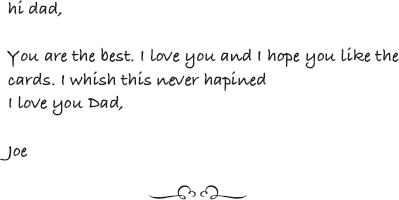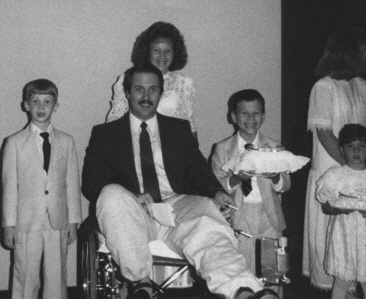90 Minutes in Heaven (13 page)

Then the dam broke. Tears slid down my cheeks, and I couldn’t wipe them away—and I didn’t even want to try. They just flowed. The tears wouldn’t stop, and I cried as I had never wept before. I’m not sure, but I think the crying lasted for about an hour.
Slowly the sobbing subsided. Calmness swept over me, and I lay relaxed and very much at peace. That’s when I realized another miracle had taken place: My depression had lifted. Vanished.
I had been healed. Again.
Stark reminders from some simple songs had changed me. The Imperials reminded me that Satan is a liar. He wants to steal our joy and replace it with hopelessness. When we’re up against a struggle and we think we can’t keep going, we can change that by praising God. Our chains will fall from us.
Meese encouraged me by reminding me of the real reason we have for fully living this life. It’s to give everything we have to God—even the heartbreaks and pain. God is our reason to live.
That morning I determined to get on with living the rest of my life, no matter what. I made that decision with no psychiatric help, no drugs, and no counseling. As I listened to those two songs, God had healed me. The despair lifted. My mental chains had broken. I also knew that nothing I had gone through—or would endure—was as horrific as what Jesus suffered.
I’m not trying to imply that I’m against psychological help. Before and since my accident, I’ve sent many people for counseling. But because I wasn’t open to help of any kind, God healed me in a dramatic and unexplainable way.
As I lay there, my attitude changed. I had no idea when my physical pain would end or how long I’d have to wear the Ilizarov frame, but I knew Jesus Christ was with me. I still didn’t understand why God had sent me back to live with all of this agony, but that no longer mattered.
Now I was free. He had healed my mind. My body would mend slowly, but I had experienced the major victory. Never again would depression afflict me. It was just one more miracle from heaven.
So humble yourselves under the mighty power of God, and in his good time he will honor you. Give all your worries and cares to God, for he cares about what happens to you.
1
P
ETER 5:6–7
S
ome people who have known me for a long time see me as some kind of courageous figure. I certainly haven’t seen myself that way—not for an instant—because I know too much about the real me. I also know how little I did to get through my ordeal.
Despite my own perceptions, friends and church members say they received encouragement by watching me as I progressed from a totally helpless state and gradually moved toward a fairly normal lifestyle. A number of individuals have said to me in the midst of their own difficult times, “If you could go through all you endured, I can go through this.”
I’m glad they’ve been heartened by my example, but I’ve had a great deal of difficulty accepting myself as a source of inspiration and courage. I don’t know how to cope with their admiration and praise, because I didn’t do anything. I wanted to die. How uplifting can that be?
When people tell me how inspiring I’ve been, I don’t argue with them, of course, but I remember only too well the time David Gentiles told me that he and others would pray me back to health. I lived because others wouldn’t let me die. Those praying friends are the ones who deserve the admiration.
Most of the time when people have that if-you-can-do-it attitude, I nod, acknowledge what they’re saying, and add, “I’m just doing the best I can.” And really, that’s all I did during the worst days. Sometimes “the best I can” was nothing but to endure. Even when I struggled with depression, it was still the best I could do. Maybe that’s what God honors. I don’t know.
By nature, I’m a determined individual, which I admit can sometimes be a first cousin to stubbornness. Yet many times I felt terribly alone and was convinced that no one else understood. And I still think that’s true. When our pain becomes intense and endures for weeks without relief, no one else really knows. I’m not sure it’s worthwhile for them to know what it’s like.
They care. That’s what I think is important.

After I came home from the hospital in the middle of May, I still had to sleep in a hospital bed until February 1990—a total of thirteen months. Even after sleeping in my own house, I had setbacks of various kinds or developed infections. Back to the hospital I’d go, and some of those trips, especially in the early days, were for life-threatening infections. Sometimes I stayed two weeks and other times three. On most occasions Eva drove me there, but I always came home in an ambulance.
After they initially released me from the hospital, church members kept telling me how good I looked “considering all that’s happened.” No one actually said the words, but I imagined them saying, “We prayed for Don. We can’t believe how well it turned out. We asked for him to live, and we asked for him to be better.” That is, I was a pitiful mess, but I was alive and that’s what they had asked for.
My twin sons, Joe and Christopher, were only eight at the time of the accident, and our daughter, Nicole, was twelve. One of the things that hurt me most during my recovery was the sense of pain my children had to cope with. They didn’t say a great deal, but I knew how they felt.
This is a handmade card from my son Joe, written to me in February 1989 while he was living with his grandparents. (I didn’t correct the spelling.)

Months later when I finally came home, most afternoons, Joe’s twin, Chris, came in from school and into the large living room where my bed was. Without saying a word, Chris would walk over and lay his head on my chest. I don’t know how long his head lay there, probably not more than a full minute.
He never said a word.
He didn’t need to. That simple gesture was enough. I felt so loved by my son.
After a minute or so, Chris would go into his room, get out of his school clothes, change into his play clothes, and then go outside and play. That’s the way he greeted me almost every day.
I know it was hard on him—really hard on him—and he expressed his grief in the only way he knew how.

Just six months after the accident, I was able to participate in a very special moment for Nicole.
Southern Baptists have mission organizations for young people. The most well-known are the Royal Ambassadors for boys and Girls in Action (GAs) and Acteens for girls. As soon as she was old enough, Nicole participated in GAs and Acteens. She fulfilled all the requirements, such as Scripture memorization, various service projects, and mission trips. When she was fourteen, she learned she would be awarded the honor of Queen with Scepter at a coronation ceremony at South Park Baptist Church in June 1989.
This award is the pinnacle of Acteen participation and is presented during a church ceremony. Her receiving the award was a tribute to her own utter determination. During the time she threw herself into those activities, she wasn’t able to live at home. Our friends Suzan and Stan Mauldin had opened their home to her, and she lived with them. Nicole received no emotional or physical support from me, because I was barely surviving in the hospital. She received little support from her mother, because Eva’s

Don attends Nicole’s Girls in Action coronation.
life consisted of leaving school every afternoon and rushing to the hospital, where she stayed with me until she went home to bed.
The challenges made us all the more proud of Nicole.
One of the traditions associated with the coronation is that fathers escort their daughters down the aisle. Brothers, if the girls have any, follow and carry the crown and scepter.
Because of the timing of South Park’s annual coronation, there was great doubt about my being able to be present, much less escort her down the aisle.
I’m grateful that my doctors discharged me from the hospital in time to be present for the coronation. I really wanted to be there. This wasn’t her wedding, but it was the biggest thing so far in her young life, and I wanted to share the moment with her.
I was in a wheelchair, and Nicole held my arm as I rolled down the aisle. Chris and Joe walked behind us, carrying her crown and scepter on pillows. They also helped roll my chair down the aisle. I wore a suit coat and tie (my first time since the accident) along with my warm-ups split down the sides to allow for my Ilizarov.
Not only was Nicole absolutely elated that her daddy could be present for her extremely important occasion, she was thrilled that her father could “walk” her down the aisle.
Tears filled my eyes as I maneuvered down the aisle. I heard others sniffling. But I also knew that we wept tears of joy over this wonderful moment in Nicole’s life.

The doctors sent me home initially, I believe, because they thought I’d recover faster in an environment with family around me. It may also have cost a lot less for me to be home. I’m not sure, but I was glad to be out of the hospital. Insurance didn’t pay for any of my treatment. The bill was covered at first by workmen’s compensation, and ultimately the State of Texas, because a federal court found them at fault.
